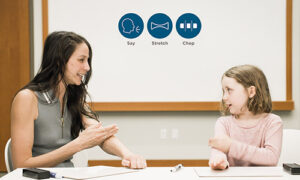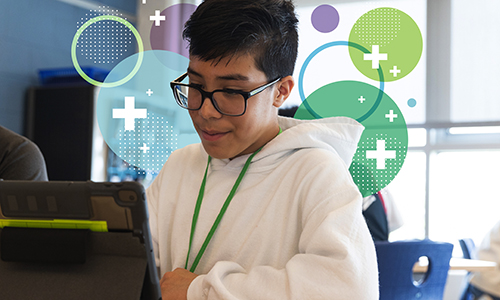Understanding the new
Lexile Framework for Oral Reading
Understanding the new Lexile Framework for Oral Reading
The benefits of reading out loud are numerous, from making complex ideas more accessible to exposing students to vocabulary and syntax that aren’t part of everyday speech.
Findings from a recent National Association of Educational Progress (NAEP) study show that reading comprehension is connected to a student’s ability to read text fluently and accurately, and to their ability to recognize and decode words. Yet, the same findings indicate only 35% of students in the fourth grade are at or above the proficiency level in reading.
View briefTopics: Literacy
Products: MAP Reading Fluency
Related Topics


Video
Getting started with simple spelling routines
NWEA Professional Learning literacy expert Dr. Tiffany Peltier shares her approach for teachers to use spelling to reinforce phonics skills.
Topics: Early learning, Literacy, Science of reading
Products: Professional Learning


Video
Helping kids understand and retain new vocabulary
NWEA Professional Learning literacy expert Dr. Tiffany Peltier shares a variety of techniques for introducing new vocabulary words, including several ideas to get the kids talking to each other and involved in creating usage examples.
Topics: Early learning, Literacy, Science of reading
Products: Professional Learning


Video
Getting started with multisyllabic spelling routines
NWEA Professional Learning literacy expert Dr. Tiffany Peltier demonstrates how spelling and word-chaining routines can be used to reinforce more complex vocabulary.
Topics: Early learning, Literacy, Science of reading
Products: Professional Learning


Video
Beginning letter-sounds – science of reading demo
NWEA Professional Learning literacy expert Dr. Tiffany Peltier welcomes students to the NWEA Learning Lab to go through some beginner techniques for learning letter sounds and sounding out words, including the benefits of teaching blendable phonemes.
Topics: Early learning, Literacy, Science of reading
Products: Professional Learning


Video
Simple spelling routine – science of reading student demo
NWEA Professional Learning literacy expert Dr. Tiffany Peltier welcomes students to the NWEA Learning Lab to demonstrate some simple spelling routines.
Topics: Early learning, Literacy, Science of reading
Products: Professional Learning


Brochure
MAP Reading Fluency Professional Learning Overview
Turn learning evidence into instructional action
Activate MAP® Reading Fluency™ with professional learning around using your assessment data to gain a more holistic view of early readers’ abilities and how to target instruction that is just right for each student and track learning progress.
Topics: Assessment, Early learning, Instructional strategies, Literacy, Professional learning
Products: MAP Reading Fluency, Professional Learning


Brochure
MAP Growth Professional Learning Overview
Turn learning evidence into instructional action
Activate MAP® Growth™ with professional learning experiences that build basic product-use capacity, hone assessment literacy, improve goal setting and responsive instructional planning, and build deeper data competency.
Topics: Assessment, Instructional strategies, Literacy, Math, Professional learning
Products: MAP Growth, Professional Learning